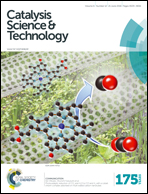Catalytic depolymerisation of isolated lignin to fine chemicals: part 2 – process optimisation
Abstract
The depolymerisation of an ammonia treated lignin to alkylphenols over a Pt/alumina catalyst was investigated under a range of process parameters including, pressure, mass of lignin, solvent and gas atmosphere. The depolymerisation was shown to be under kinetic control and orders of reaction in hydrogen and lignin were determined as 0.4 and 0 respectively. Hydrogen was shown to be necessary under our reaction conditions as when helium was used as the gas atmosphere poor conversion was obtained. A clear solvent effect was observed with 100% methanol being more effective than 100% water or any combination of the two with a yield of alkylphenols >40% with a selectivity of >40% to substituted 4-propyl-2,6-dimethoxyphenol compounds. This high yield using methanol as a solvent was thought to be due to the ability of the methanol to inhibit re-polymerisation. IPA/water was also found to be an effective solvent combination with a yield of alkylphenols of >20%. The depolymerisation reaction was also studied over Rh/alumina and Ir/alumina catalysts. The rhodium catalyst was found to be the most active on a weight basis being slightly more active than platinum, however on a molar basis the platinum was much more active.



 Please wait while we load your content...
Please wait while we load your content...